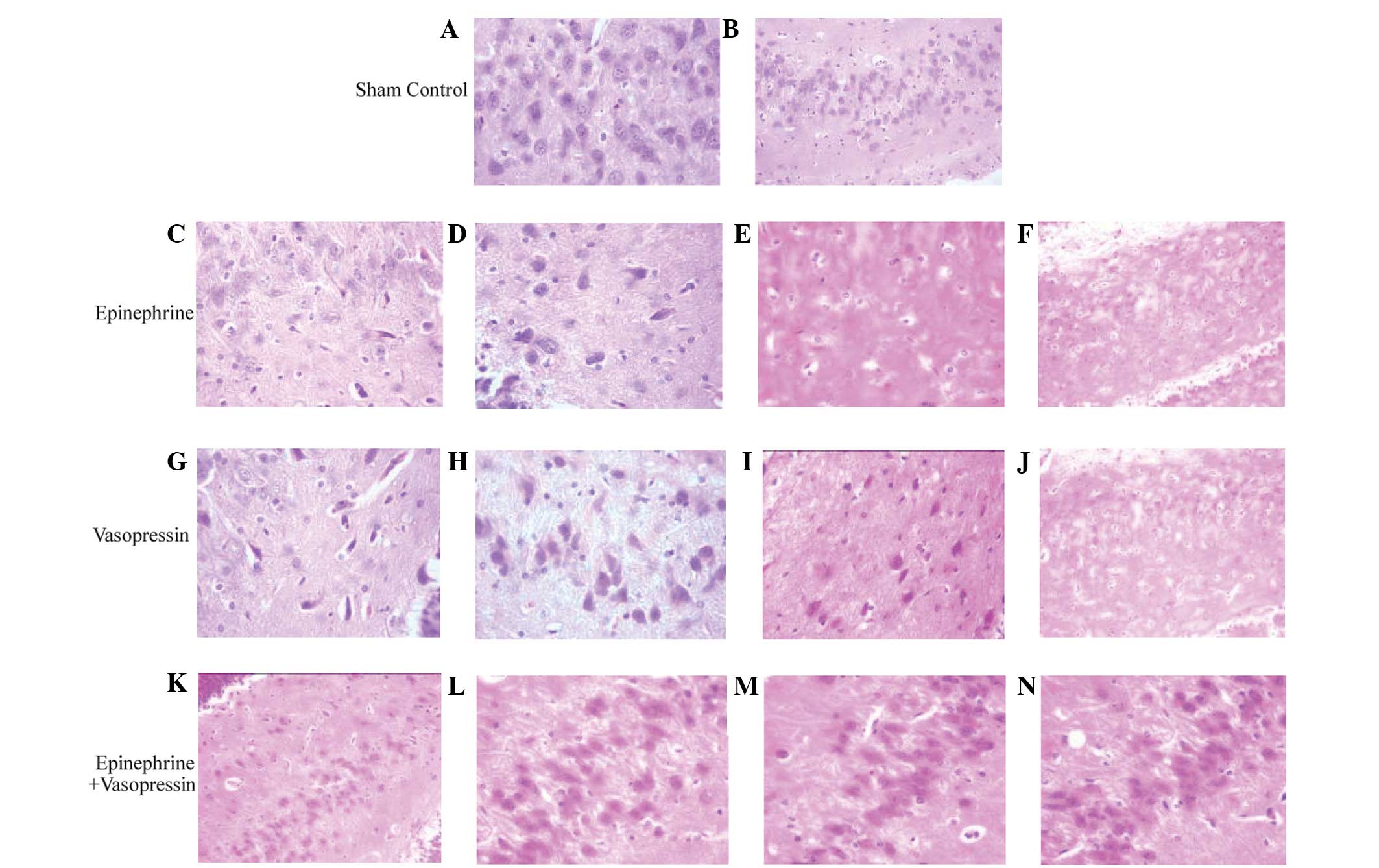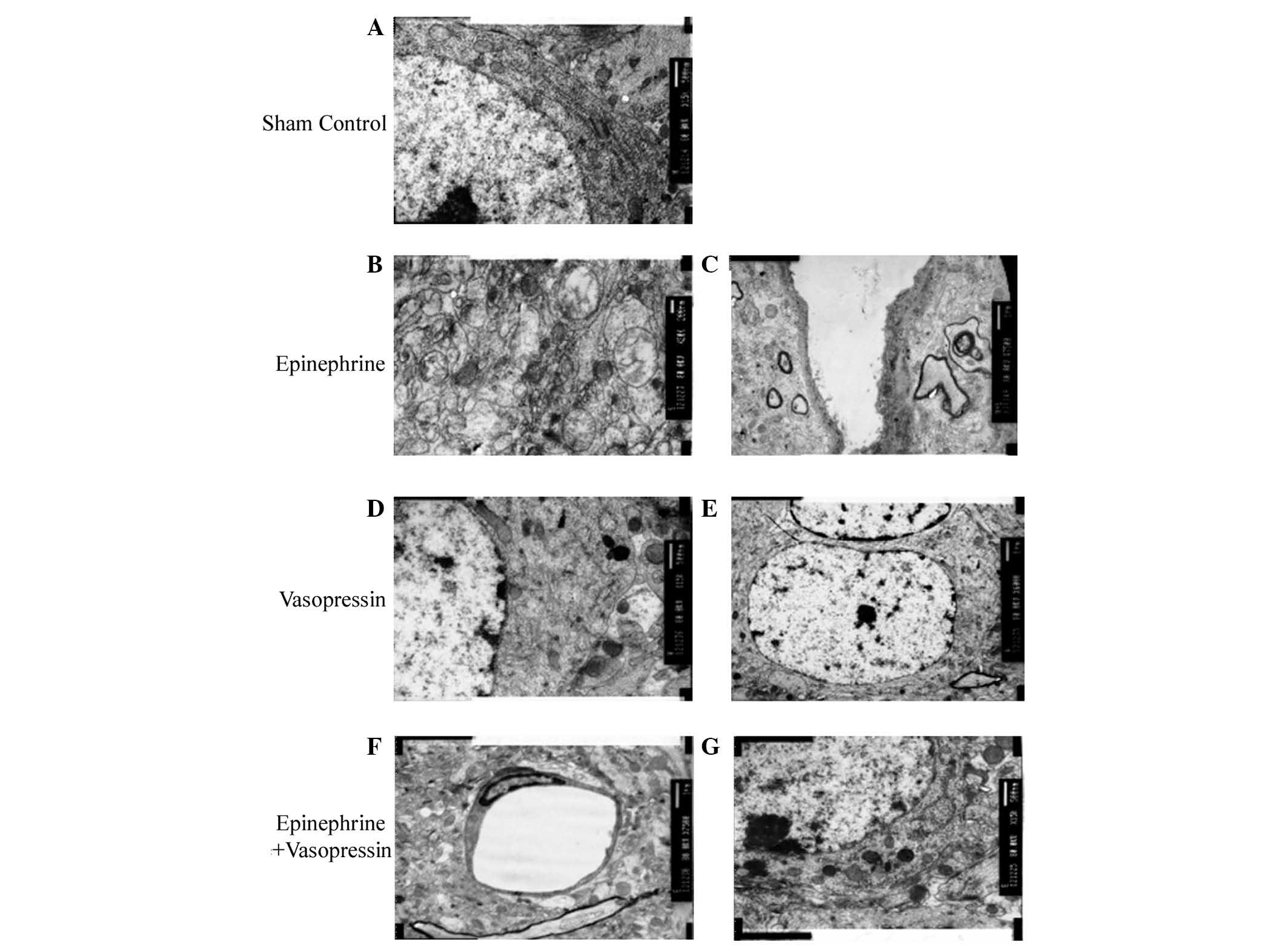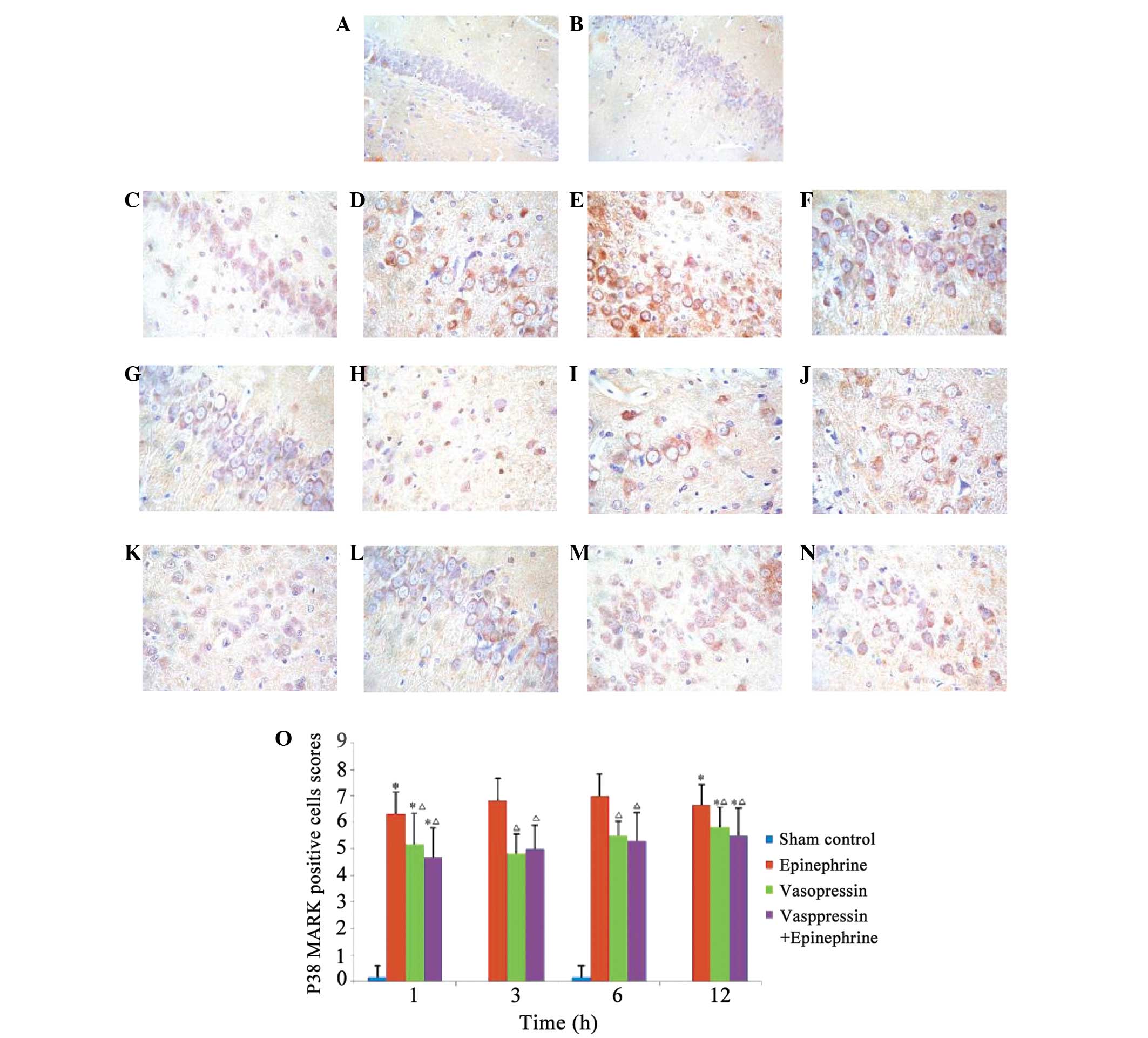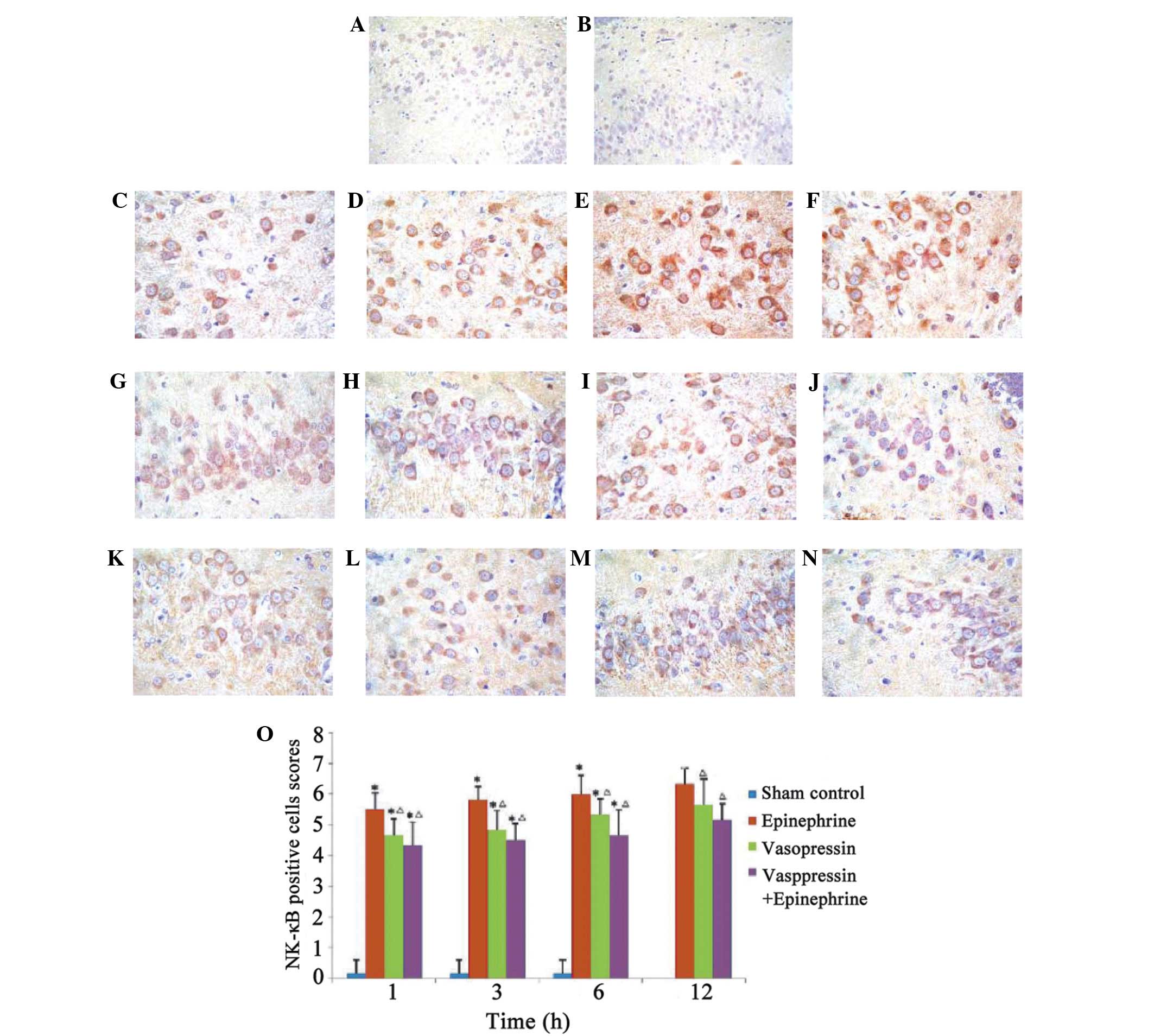|
1
|
Gueugniaud PY, David JS, Chanzy E, Hubert
H, Dubien PY, Mauriaucourt P, Bragança C, Billères X,
Clotteau-Lambert MP, Fuster P, et al: Vasopressin and epinephrine
vs. epinephrine alone in cardiopulmonary resuscitation. N Engl J
Med. 359:21–30. 2008. View Article : Google Scholar : PubMed/NCBI
|
|
2
|
Mentzelopoulos SD, Zakynthinos SG, Tzoufi
M, Katsios N, Papastylianou A, Gkisioti S, Stathopoulos A,
Kollintza A, Stamataki E and Roussos C: Vasopressin, epinephrine
and corticosteroids for in-hospital cardiac arrest. Arch Intern
Med. 169:15–24. 2009. View Article : Google Scholar : PubMed/NCBI
|
|
3
|
Rudiger A, Tobler D and Estlinbaum W:
Frequency and outcome of in-hospital resuscitation outside the
ICU-setting. Swiss Med Wkly. 134:59–62. 2004.PubMed/NCBI
|
|
4
|
Stiell IG, Wells GA, Field B, Spaite DW,
Nesbitt LP, De Maio VJ, Nichol G, Cousineau D, Blackburn J, Munkley
D, et al: Advanced cardiac life support in out-of-hospital cardiac
arrest. N Engl J Med. 351:647–656. 2004. View Article : Google Scholar : PubMed/NCBI
|
|
5
|
Girotra S, Nallamothu BK, Spertus JA, Li
Y, Krumholz HM and Chan PS: American Heart Association Get with the
Guidelines-Resuscitation Investigators: Trends in survival after
in-hospital cardiac arrest. N Engl J Med. 367:1912–1920. 2012.
View Article : Google Scholar : PubMed/NCBI
|
|
6
|
Luo CL, Li QQ, Chen XP, Zhang XM, Li LL,
Li BX, Zhao ZQ and Tao LY: Lipoxin A4 attenuates brain damage and
downregulates the production of pro-inflammatory cytokines and
phosphorylated mitogen-activated protein kinases in a mouse model
of traumatic brain injury. Brain Res. 1502:1–10. 2013. View Article : Google Scholar : PubMed/NCBI
|
|
7
|
Maroney AC, Glicksman MA, Basma AN, Walton
KM, Knight E Jr, Murphy CA, Bartlett BA, Finn JP, Angeles T,
Matsuda Y, et al: Motoneuron apoptosis is blocked by CEP-1347 (KT
7515), a novel inhibitor of the JNK signaling pathway. J Neurosci.
18:104–111. 1998.PubMed/NCBI
|
|
8
|
Barone FC, Irving EA, Ray AM, Lee JC,
Kassis S, Kumar S, Badger AM, Legos JJ, Erhardt JA, Ohlstein EH, et
al: Inhibition of p38 mitogen-activated protein kinase provides
neuroprotection in cerebral focal ischemia. Med Res Rev.
21:129–145. 2001. View Article : Google Scholar : PubMed/NCBI
|
|
9
|
Yasuda S, Sugiura H, Tanaka H, Takigami S
and Yamagata K: p38 MAP kinase inhibitors as potential therapeutic
drugs for neural diseases. Cent Nerv Syst Agents Med Chem.
11:45–59. 2011. View Article : Google Scholar : PubMed/NCBI
|
|
10
|
van Loo G, De Lorenzi R, Schmidt H, Huth
M, Mildner A, Schmidt-Supprian M, Lassmann H, Prinz MR and
Pasparakis M: Inhibition of transcription factor NF-kappaB in the
central nervous system ameliorates autoimmune encephalomyelitis in
mice. Nat Immunol. 7:954–961. 2006. View
Article : Google Scholar : PubMed/NCBI
|
|
11
|
Niu YL, Zhang WJ, Wu P, Liu B, Sun GT, Yu
DM and Deng JB: Expression of the apoptosis-related proteins
caspase-3 and NF-kappaB in the hippocampus of Tg2576 mice. Neurosci
Bull. 26:37–46. 2010. View Article : Google Scholar : PubMed/NCBI
|
|
12
|
Xu L, Zhan Y, Wang Y, Feuerstein GZ and
Wang X: Recombinant adenoviral expression of dominant negative
IkappaBalpha protects brain from cerebral ischemic injury. Biochem
Biophys Res Commun. 299:14–17. 2002. View Article : Google Scholar : PubMed/NCBI
|
|
13
|
van der Kooij MA, Nijboer CH, Ohl F,
Groenendaal F, Heijnen CJ, van Bel F and Kavelaars A: NF-kappaB
inhibition after neonatal cerebral hypoxia-ischemia improves
long-term motor and cognitive outcome in rats. Neurobiol Dis.
38:266–272. 2010. View Article : Google Scholar : PubMed/NCBI
|
|
14
|
Wang JY, Shen J, Gao Q, Ye ZG, Yang SY,
Liang HW, Bruce IC, Luo BY and Xia Q: Ischemic postconditioning
protects against global cerebral ischemia/reperfusion-induced
injury in rats. Stroke. 39:983–990. 2008. View Article : Google Scholar : PubMed/NCBI
|
|
15
|
Callaway CW: Epinephrine for cardiac
arrest. Curr Opin Cardiol. 28:36–42. 2013. View Article : Google Scholar : PubMed/NCBI
|
|
16
|
Nakahara S, Tomio J, Nishida M, Morimura
N, Ichikawa M and Sakamoto T: Association between timing of
epinephrine administration and intact neurologic survival following
out-of-hospital cardiac arrest in Japan: A population-based
prospective observational study. Acad Emerg Med. 19:782–792. 2012.
View Article : Google Scholar : PubMed/NCBI
|
|
17
|
Nakahara S, Tomio J, Takahashi H, Ichikawa
M, Nishida M, Morimura N and Sakamoto T: Evaluation of pre-hospital
administration of adrenaline (epinephrine) by emergency medical
services for patients with out of hospital cardiac arrest in Japan:
Controlled propensity matched retrospective cohort study. BMJ.
347:f68292013. View Article : Google Scholar : PubMed/NCBI
|
|
18
|
Lurie KG, Voelckel WG, Iskos DN, McKnite
SH, Zielinski TM, Sugiyama A, Wenzel V, Benditt D and Lindner KH:
Combination drug therapy with vasopressin, adrenaline (epinephrine)
and nitroglycerin improves vital organ blood flow in a porcine
model of ventricular fibrillation. Resuscitation. 54:187–194. 2002.
View Article : Google Scholar : PubMed/NCBI
|
|
19
|
Aoyagi T, Koshimizu TA and Tanoue A:
Vasopressin regulation of blood pressure and volume: Findings from
V1a receptor-deficient mice. Kidney Int. 76:1035–1039. 2009.
View Article : Google Scholar : PubMed/NCBI
|
|
20
|
Mayr VD, Wenzel V, Voelckel WG, Krismer
AC, Mueller T, Lurie KG and Lindner KH: Developing a vasopressor
combination in a pig model of adult asphyxial cardiac arrest.
Circulation. 104:1651–1656. 2001. View Article : Google Scholar : PubMed/NCBI
|
|
21
|
Stadlbauer KH, Wagner-Berger HG, Wenzel V,
Voelckel WG, Krismer AC, Klima G, Rheinberger K, Pechlaner S, Mayr
VD and Lindner KH: Survival with full neurologic recovery after
prolonged cardiopulmonary resuscitation with a combination of
vasopressin and epinephrine in pigs. Anesth Analg. 96:1743–1749.
2003. View Article : Google Scholar : PubMed/NCBI
|
|
22
|
Varvarousi G, Johnson EO, Goulas S,
Agrogiannis G, Valsamakis N, Perrea D, Stefanadis C, Papadimitriou
L and Xanthos T: Combination pharmacotherapy improves neurological
outcome after asphyxial cardiac arrest. Resuscitation. 83:527–532.
2012. View Article : Google Scholar : PubMed/NCBI
|
|
23
|
Kono S, Bito H, Suzuki A, Obata Y,
Igarashi H and Sato S: Vasopressin and epinephrine are equally
effective for CPR in a rat asphyxia model. Resuscitation.
52:215–219. 2002. View Article : Google Scholar : PubMed/NCBI
|
|
24
|
Chen MH, Xie L, Liu TW, Song FQ and He T:
Naloxone and epinephrine are equally effective for cardiopulmonary
resuscitation in a rat asphyxia model. Acta Anaesthesiol Scand.
50:1125–1130. 2006. View Article : Google Scholar : PubMed/NCBI
|
|
25
|
Chen MH, Liu TW, Xie L, Song FQ and He T:
Does naloxone alone increase resuscitation rate during
cardiopulmonary resuscitation in a rat asphyxia model? Am J Emerg
Med. 24:567–572. 2006. View Article : Google Scholar : PubMed/NCBI
|
|
26
|
Remmele W and Stegner HE: Recommendation
for uniform definition of an immunoreactive score (IRS) for
immunohistochemical estrogen receptor detection (ER-ICA) in breast
cancer tissue. Pathologe. 8:138–140. 1987.(In German). PubMed/NCBI
|
|
27
|
Lim C, Alexander MP, LaFleche G, Schnyer
DM and Verfaellie M: The neurological and cognitive sequelae of
cardiac arrest. Neurology. 63:1774–1778. 2004. View Article : Google Scholar : PubMed/NCBI
|
|
28
|
Wenzel V, Linder KH, Augenstein S, Prengel
AW and Strohmenger HU: Vasopressin combined with epinephrine
decreases cerebral perfusion compared with vasopressin alone during
cardiopulmonary resuscitation in pigs. Stroke. 29:1462–1467,
Discussion 1467–1468. 1998. View Article : Google Scholar : PubMed/NCBI
|
|
29
|
Philpott KL and Facci L: MAP kinase
pathways in neuronal cell death. CNS Neurol Disord Drug Targets.
7:83–97. 2008. View Article : Google Scholar : PubMed/NCBI
|
|
30
|
Sugino T, Nozaki K, Takagi Y, Hattori I,
Hashimoto N, Moriguchi T and Nishida E: Activation of
mitogen-activated protein kinases after transient forebrain
ischemia in gerbil hippocampus. J Neurosci. 20:4506–4514.
2000.PubMed/NCBI
|


















